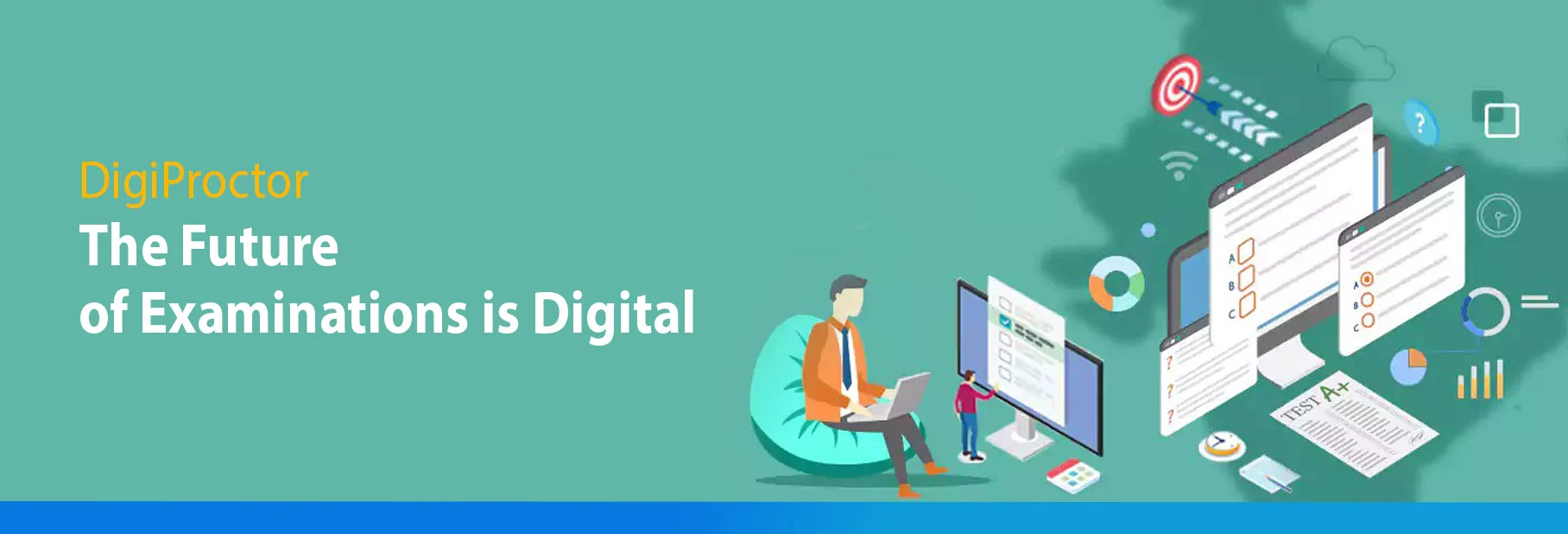
The Future of Examinations is Digital
Many institutions have recently opted out of the conventional pen-and-paper-based mode of examination to embrace the digital mode. However, conducting online (proctored or non-proctored) exams using digital technologies is not the same thing as embarking on a transformation journey of your examination management system. In fact, it’s just the beginning.
The push factor for most institutions in India was the UGCs diktat that universities must hold exams - online, off-line, or blended – without any further delay to ensure the progression of students' academic future.
The migration of institutions to digital education and examination is not only essential for effective learning but it’s a catalyst for a much larger transformation of the education sector. The crisis has made us realize that technological solutions for learning, proctoring, and assessments are efficient, timesaving, accurate, and secure – only a shift in mindset is required for this to be wholly accepted and successfully implemented.
Advantages of Online Examinations and Evaluation
We need to embrace digital technologies not only to impart knowledge but also securely conduct examinations, accurately assess, evaluate, and analyze students' and test performance. It entails moving all the examination processes and workflows online where test taking is just one of the activities.
For the institutions the online mode to conduct examinations allows the convenience to set exam schedules, manage student validation and authentication, securely carry out exams, and monitor students online. Students and proctors (invigilators) can be in different geographical locations and have bidirectional communication to ensure the integrity of the examinations. Results processing is agile, evaluation errors are eliminated and biases are ruled out - universities and students get a detailed view of performance in the examination.
Online evaluation (e-marking the answers to subjective questions) eliminates the chances of losing answer scripts (as they are available online) and quickens the evaluation process leading to the results being declared earlier, reducing stress and pressure on students and faculty. The system also alerts the evaluator in case any answer script missed a review.
Stakeholders perform their (assigned) tasks asynchronously and the planform enables the examination body to get a dashboard view of the status of all the activities – COE/admin office orchestrates all the activities to facilitate the smooth run of the examinations. The examination system guarantees data integrity by giving authorization only to approved personnel.
Digiproctor is designed to facilitate universities to transform and transition their entire examination process and workflows into digital mode. It provides a highly secure and scalable platform for proctored and non-proctored test delivery across laptops and mobiles and protects the integrity and reliability of the examinations.
An online examination management system is a boon for the students. Students can take exams from anywhere (using any device) and they don't have to travel to a specific location. It’s been proved that they perform much better and are less anxious when they take exams from the comfort of their homes. There is transparency in the result processing and agility in result declaration. The students' portal enables access to their answer scripts where they can view the marked answer sheets they have uploaded during their exam (using the DigiProctor upload app).
Digiproctor also creates personal dashboards for each student where they can login to view university notifications, view their test schedule & details, get their test keys, and also view their results post-exam. DigiProctor application and apps interfaces are designed to keep the navigation intuitive and user friendly.
Lean In
Forward leaning institutions are adopting digital examination management systems. However, for this transformation to be successfully implemented, all the stakeholders of the examination body – administration, faculty, and students- need to have the digital competence and keenness for technology acceptance.
User training is critical prior to the migration of the examination body to the digital examinations. Digiproctor team conducts comprehensive training for students and professors through a system of webinars, easy-to-understand guides and videos, mock tests, demos, and Q&A sessions. These training are done for students, as well as professors who have been assigned the roles of Controller of Exam (CoE), exam office staff, question paper creators, proctors, and evaluators.
Communication and support are vital for the smooth run of the examination. Transitioning to the new mode of online examinations requires universities to initiate a major change management process to prepare students and professors to adapt to the new environment. To communicate with students and professors, before/after, and during the exams, Digiproctor has in-built tools that enable communication via SMSs, emails, and mass notifications.
Hence, we feel it's not just the technology, but also the continuous support, training, and the willingness of the examination body, faculty members, and students to migrate to digital examination that has made their transformation journey successful.